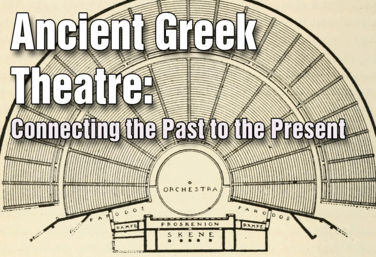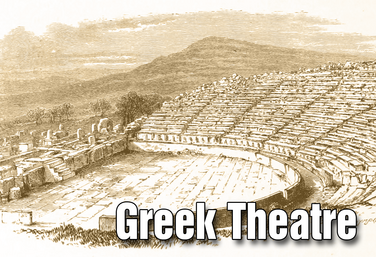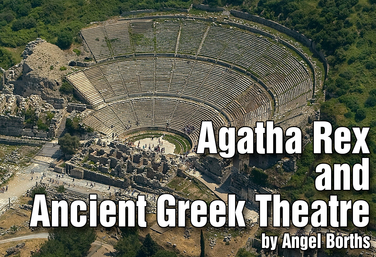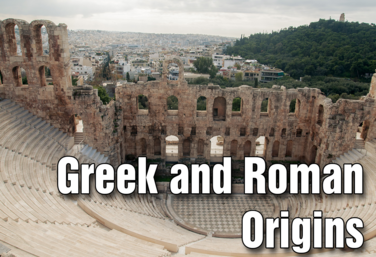Items tagged "Ancient Greek Theatre"
4 Units, 6 Lesson Plans, and 3 Resources tagged "Ancient Greek Theatre" for Drama Teachers.
Units
Ancient Greek Theatre
by Lindsay Price
In studying Ancient Greece, we’re looking at the foundations of theatre as we know it today. Without the Ancient Greek Era, we do not get actors, theatres, plays, and the definitions of tragedy and comedy.
The issue with studying theatre history, or anything historical is that it can become an exercise in memorizing dates and reciting facts. When the truth of the matter is no one in the 21st century benefits from learning by rote. This is especially true when studying history in the framework of a drama classroom. We need exercises that bring history to life, instead of having students plot dates on a timeline.
To that end, this unit does not focus on dates and data. The essential question for the unit is how can we connect the past to the present and this question is explored through the theatricalization of information. Students will access all four 21st century skills, critical thinking, creative thinking, collaboration and communication as they explore this amazing world.
Reflections, exit slips, and rubrics are included throughout the unit as well as a mid assignment evaluation for the culminating project.
Read More...
Read Less...
Ancient Greek Theatre
by Karen Loftus
This unit on Ancient Greek theatre focuses on the function of the chorus, the choral ode, and the details of the theatre space. It touches on plays and playwrights of the era, culminating in a final project of a modern version of Medea that includes a choral ode.
Read More...
Read Less...
Agatha Rex and Ancient Greek Theatre
by Angel Borths
Help…It’s all Greek to me! Join Angel Borths in this unit that uses a modern adaptation of the Ancient Greek play Antigone to introduce Middle School students to Ancient Greek Theatre.
Have your students read Percy Jackson and want to find out more about Ancient Greece? Then, this unit is for you. This unit is designed for middle and high school students and will take you through the basics of classical Greek theatre and pairs it with a modern adaptation of the story of Antigone called Agatha Rex by Lindsay Price. Students will learn vocabulary, design, and basic theory surrounding classical Greek theatre. Students will also enjoy the mask building component of this unit, as they learn to disappear into the character of a mask, like the first actors did on a Greek stage thousands of years ago.
The unit culminates in a scene performance with masks.
Read More...
Read Less...
Unit 2: Greek & Roman Origins
by Drama Teacher Academy
For Ancient Greece, we will examine the ritual origins of tragedy and the Festival of Dionysus. We will explore the theatre conventions of the day including the amphitheatre, the use of masks, costumes, and other theatrical devices. Finally, we will introduce the main playwrights and their key plays. Then we will take a short look at Roman theatre with their wholesale appropriation of Greek culture.
Read More...
Read Less...
Lesson Plans
The Ancient Greeks
by Lindsay Price
The Ancient Greek Theatre is the birth of the modern theatre. We can look at the production of theatre in that time and see similarities to how we present theatre today. But where do we start? And how do we make theatre history more than the collection of data? It’s hard for students to conceptualize an era that happened so long ago as populated with real people. This lesson plan encourages discussion, application, and reflection on the Ancient Greeks.
Be sure to check out the Ancient Greek Theatre handout as an accompaniment to this lesson. A powerpoint link is also included that is ready to use in your classroom!
Read More...
Read Less...
The Ancient Greeks - Handout
by Lindsay Price
This handout is designed as an accompaniment to The Ancient Greeks lesson plan. The two-page handout includes visuals and a description of who the ancient greeks were, including democracy/slavery, the role of women, war/culture, competition, and the Gods.
Read More...
Read Less...
Who is Thespis?
by Lindsay Price
Thespis is often stated as being the first actor because he stepped away from the chorus. But who is he? What do we know as fact and what has been assumed as his origin story? What happens when unreliable evidence is recorded as historical fact? Does it matter?
In this lesson, students will draw their own conclusions about the validity of Thespis as a reliable figure in theatre history. They will also write a monologue from the perspective of a character who shares their viewpoint.
Read More...
Read Less...
Who is Thespis? Project Version
by Lindsay Price
Thespis is often stated as being the first actor because he stepped away from the chorus. But who is he? What do we know as fact and what has been assumed as his origin story? What happens when unreliable evidence is recorded as historical fact? Does it matter?
In this lesson, students will research, present and draw their own conclusions about the validity of Thespis as a reliable figure in theatre history. They will then write and present a scene that showcases their viewpoint.
*This lesson requires internet accessibility (for students to research for the project) either during class time or afterward as assigned homework.
Read More...
Read Less...
The 21st Century Story
by Lindsay Price
Theatre is about communication. A story is presented to an audience. Storytelling was one of the earliest forms of entertainment that we continue to use today. Even though the method for delivering the story has changed, the form itself has stayed the same for thousands of years.
In this lesson, students will create their version of the 21st century story. What stories do we tell today? How do we tell them? Who do we tell them to?
You can use this lesson as an intro to studying modern theatre, especially for students who don’t have a theatre background. You can also use this lesson as an intro for Ancient Greek Theatre. Start by examining stories in a modern context, then shift to the Ancient Greek era.
Read More...
Read Less...
Emergency Lesson Plan: Compare and Contrast (Ancient Greek)
by Lindsay Price
In this ELP, students will read and discuss a scene from an Ancient Greek theatrical text and a modern adaptation of that text: The Libation Bearers by Aeschylus (translated by H.W. Smyth) and The Exile and the Onion Girl by Lindsay Price.
Read More...
Read Less...
Resources
Ancient Greek Theatre: Agamemnon
This resource includes a guide to Agamemnon including Characters, Synopsis, Themes, Questions and Activities.
Read More...
Read Less...
Ancient Greek Theatre: Medea
This resource for Medea includes Characters, Synopsis, Themes, Questions and Activities
Read More...
Read Less...
Ancient Greek Theatre: Oedipus Rex
This resource for Oedipus Rex includes Characters, Synopsis, Themes, Questions and Activities.
Read More...
Read Less...
© Copyright 2015-2025 Theatrefolk



